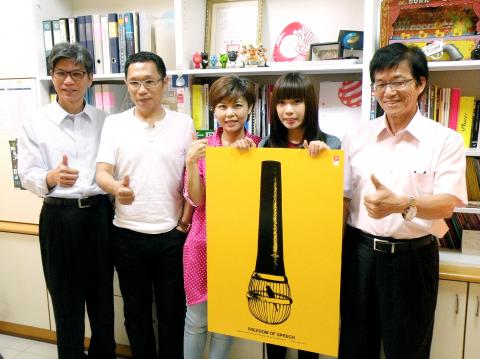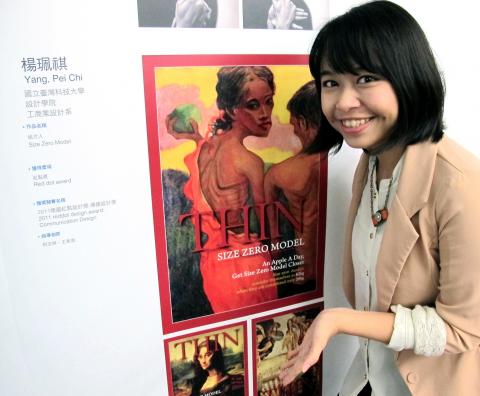Young Taiwanese designers shined at this year’s German iF Concept Design Award competition, with 24 entries making it into the top 100, and four reaching the top 10.
The competition received more than 12,000 submissions from 58 countries this year and only 340 submissions made it past the judging panels to reach the final round for the selection of the top 100. From this final 100, the 10 best were selected for cash prizes.
Among Taiwanese entries, Ou Pei-ling (歐佩玲) of Greater Kaohsiung’s Shu-Te University received the highest rank of third place for a poster titled Freedom of Speech.

Photo: Su Fu-nan, Taipei Times
“We always see famous people, celebrities, the wealthy and those holding power speaking and being reported on the news. However, less privileged groups have no access to the media. Their voices and opinions are subjugated or taken away. So I chose freedom of speech as the central theme of my design,” said Ou, a student in the university’s Department of Visual Communication Design.
She said it took her a week to create the poster, adding that her professor, Chang Chien-feng (張建豐), gave her useful advice.
“He reminded me to think on a deeper level. So I turned the microphone upside-down to express the idea of protesting voices. Restrictions on freedom of speech are represented by the image of the caged bird,” she said.

Photo courtesy of Yang Pei-chi
Three other entries from Taiwanese students also made the top 10.
Among them was a product idea called “Easy plug,” designed by graduate student Huang Jui-min (黃瑞閔) and undergraduate Wu Pin-chieh (吳品潔) of Yunlin University of Science and Technology’s Department of Creative Design.
Using magnets in the center of a plug and a configuration of concentric electrodes, they designed an easy-to-use plug for inconveniently-placed sockets.
Guided by magnetic forces, users can use the product to locate even the most difficult to find sockets.
Another top 10 design was the “Easy Check” syringe designed by Wang Wei-shen (王偉燊) and Chen Hung-yu (陳泓佑), graduate students at the Department of Industrial Design at National Cheng Kung University in Greater Tainan.
Wang said his aunt has diabetes and requires an insulin injection after meals. However, due to her poor eyesight, she has to use her glasses to be able to clearly see the numeric volume markings on the syringe.
In response, the two students designed a magnifying glass on an orb that can be attached to the syringe. Through light refraction on the convex lens, the markings are magnified for easier viewing, making the syringe easier to use.
Another top 10 design came from Yang Pei-chi (楊珮祺), who submitted a series of posters on the theme of “Size Zero Models.”
Yang said she wanted to overturn the pervasive attitude of “thin is beautiful” for women, especially in the fashion industry.
Her renditions of three classic paintings — Leonardo da Vinci’s Mona Lisa, Paul Gauguin’s Three Tahitians and Sandro Botticelli’s The Birth of Venus — portrayed the female subjects as emaciated figures with jutting ribs as a parody of size-zero models.

Alain Robert, known as the "French Spider-Man," praised Alex Honnold as exceptionally well-prepared after the US climber completed a free solo ascent of Taipei 101 yesterday. Robert said Honnold's ascent of the 508m-tall skyscraper in just more than one-and-a-half hours without using safety ropes or equipment was a remarkable achievement. "This is my life," he said in an interview conducted in French, adding that he liked the feeling of being "on the edge of danger." The 63-year-old Frenchman climbed Taipei 101 using ropes in December 2004, taking about four hours to reach the top. On a one-to-10 scale of difficulty, Robert said Taipei 101

Nipah virus infection is to be officially listed as a category 5 notifiable infectious disease in Taiwan in March, while clinical treatment guidelines are being formulated, the Centers for Disease Control (CDC) said yesterday. With Nipah infections being reported in other countries and considering its relatively high fatality rate, the centers on Jan. 16 announced that it would be listed as a notifiable infectious disease to bolster the nation’s systematic early warning system and increase public awareness, the CDC said. Bangladesh reported four fatal cases last year in separate districts, with three linked to raw date palm sap consumption, CDC Epidemic Intelligence

Two Taiwanese prosecutors were questioned by Chinese security personnel at their hotel during a trip to China’s Henan Province this month, the Mainland Affairs Council (MAC) said yesterday. The officers had personal information on the prosecutors, including “when they were assigned to their posts, their work locations and job titles,” MAC Deputy Minister and spokesman Liang Wen-chieh (梁文傑) said. On top of asking about their agencies and positions, the officers also questioned the prosecutors about the Cross-Strait Joint Crime-Fighting and Judicial Mutual Assistance Agreement, a pact that serves as the framework for Taiwan-China cooperation on combating crime and providing judicial assistance, Liang

US climber Alex Honnold left Taiwan this morning a day after completing a free-solo ascent of Taipei 101, a feat that drew cheers from onlookers and gained widespread international attention. Honnold yesterday scaled the 101-story skyscraper without a rope or safety harness. The climb — the highest urban free-solo ascent ever attempted — took just more than 90 minutes and was streamed live on Netflix. It was covered by major international news outlets including CNN, the New York Times, the Guardian and the Wall Street Journal. As Honnold prepared to leave Taiwan today, he attracted a crowd when he and his wife, Sanni,